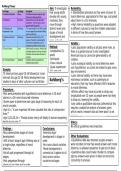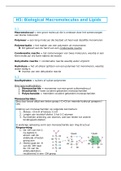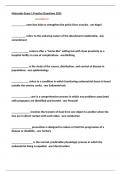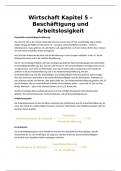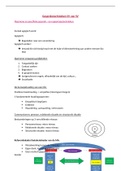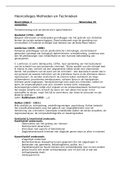Aim: To investigate Reliability:
how young adults + Standardised procedure as they were all given 10
develop into young moral dilemmas, appropriate for their age, and asked
manhood, they about them in a 2hr interview.
move through +High internal reliability as questions were adapted
distinct levels and to different cultures to help the children understand
stages of moral in terms of how they would answer.
development and
cross-culturally.
Validity :
Method: -Lacks population validity as all ppts were male, so
-Longitudinal (12 there is a gender bias as it only investigated
years) American boys so cannot be generalised to all
-Self-report children.
-Cross cultural -Lacks ecological validity as moral dilemmas were
-Quasi experiment only hypothetical, so cannot be related to ppts every
Sample: -IV’s age and day environment.
75 American boys aged 10-16 followed at 3 year
-Lacks internal validity as there may have been
intervals too age 22-28. Moral development was
studied in boys of other cultures such as Britain, Kohlberg’s extraneous variables, such as upbringing or
education, that may have affected child’s response
to moral dilemmas.
Procedure :
-Attrition affect may have occurred as study was
-Ppts were presented with hypothetical moral dilemmas in 10 short
longitudinal over 12 years so people were mor likely
stories in a 2hr semi-structured interview.
to drop out, lowering the validity.
-Stories were to determine each ppts stage of reasoning for each 25
-Less valid as qualitative data was collected but this
moral concepts.
requires a subjective analysis of answers given,
-Age 10 = “Is one important life more valuable that lots of unimportant
which create a research bias as there wasn’t a set
lives ?”
answer.
-Age 13,16,20,24 = “Should doctor mercy kill fatally ill woman requesting
death due to pain ?” Ethics:
No ethical guidelines were breached.
Findings : Conclusions:
-Boys demonstrate stages of moral -American boys’
development. development in stages in Other Evaluations:
-50% of each stage 6 ppts thinking was at order. +Qualitative data was obtained as ppts answers
a single stage, regardless of moral -No cross-cultural variation. were recorded on how they would answer each moral
dilemma. -Moral development is dilemma, so allowed researcher to get lots of detail.
-Not all ppts progressed through all universal as it applies to all -Qualitative data could make it harder to compare
stages. boys across various ppts as answers were given in detail so more time
-Ppts progressed through countries and ages. consuming to analyse.
stages at one time and in order.
how young adults + Standardised procedure as they were all given 10
develop into young moral dilemmas, appropriate for their age, and asked
manhood, they about them in a 2hr interview.
move through +High internal reliability as questions were adapted
distinct levels and to different cultures to help the children understand
stages of moral in terms of how they would answer.
development and
cross-culturally.
Validity :
Method: -Lacks population validity as all ppts were male, so
-Longitudinal (12 there is a gender bias as it only investigated
years) American boys so cannot be generalised to all
-Self-report children.
-Cross cultural -Lacks ecological validity as moral dilemmas were
-Quasi experiment only hypothetical, so cannot be related to ppts every
Sample: -IV’s age and day environment.
75 American boys aged 10-16 followed at 3 year
-Lacks internal validity as there may have been
intervals too age 22-28. Moral development was
studied in boys of other cultures such as Britain, Kohlberg’s extraneous variables, such as upbringing or
education, that may have affected child’s response
to moral dilemmas.
Procedure :
-Attrition affect may have occurred as study was
-Ppts were presented with hypothetical moral dilemmas in 10 short
longitudinal over 12 years so people were mor likely
stories in a 2hr semi-structured interview.
to drop out, lowering the validity.
-Stories were to determine each ppts stage of reasoning for each 25
-Less valid as qualitative data was collected but this
moral concepts.
requires a subjective analysis of answers given,
-Age 10 = “Is one important life more valuable that lots of unimportant
which create a research bias as there wasn’t a set
lives ?”
answer.
-Age 13,16,20,24 = “Should doctor mercy kill fatally ill woman requesting
death due to pain ?” Ethics:
No ethical guidelines were breached.
Findings : Conclusions:
-Boys demonstrate stages of moral -American boys’
development. development in stages in Other Evaluations:
-50% of each stage 6 ppts thinking was at order. +Qualitative data was obtained as ppts answers
a single stage, regardless of moral -No cross-cultural variation. were recorded on how they would answer each moral
dilemma. -Moral development is dilemma, so allowed researcher to get lots of detail.
-Not all ppts progressed through all universal as it applies to all -Qualitative data could make it harder to compare
stages. boys across various ppts as answers were given in detail so more time
-Ppts progressed through countries and ages. consuming to analyse.
stages at one time and in order.

